Spotlight
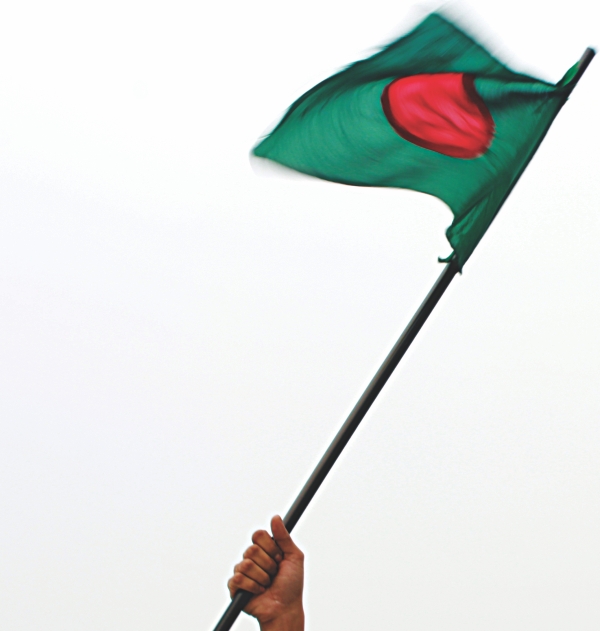
TEXTBOOK HISTORY- MISLED REALITY
Salman Rob
Promiti Prova Chowdhury
Sumaiya Ahsan Bushra
Rakibul Hasan
Naziba Basher
Saad Adnan Khan
Photos: Kazi Tahsin Agaz Apurbo
History has always been in a flux. It is not constant and static, because new information are always emerging from different sources. But what happens if history is intentionally distorted? Why will anyone condone such an unjustifiable act and what are we left with? When the young people of the nation talk about the history of Bangladesh how do they really feel? Proud, angry, brave, happy or disconnected? History should not only be treated as a subject for classrooms in the context and reality of Bangladesh-- it is a source of our identity and inspiration. A source that has been subjected to distortion and fabrication to serve political interest, a source that does not evoke emotions when read in textbooks due to insufficient information, a source that is not talked about passionately in classrooms. To look for answers, we, The Star Campus Team, went and talked to some students and eminent personalities. Their words just might turn out to be the missing pieces of the puzzle.

.............................................................................................................................
A S M Abdur Rob
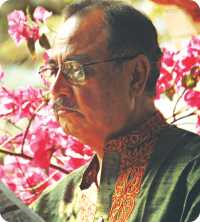 ”40 years have gone by and the history is still being distorted and not being unveiled,” says Rob. He also mentions, “It is sad how history that was made in 1971 stayed back in 1971. The whole world runs with a system of history that all the nations carry out and stand proud and on the other hand Bangladesh has its own way of making its history.” He adds, “For example look at America and how its citizens cherish their history and heritage, how much importance they give to their flag, then look at ourselves. The ones who fought for the nation are, sadly, the ones who are changing the history now." He wonders, what is there to change? The country is one and we all share it. The seventeen crore people deserve to know the truth. He says, "Maybe not now, but the truth will come out eventually. But for that to happen, someone needs to step up. 40 years is not much for me, but for the fast paced world that is a lot. Considering the rate at which the world is developing, we are falling very far behind.” Rob concludes by saying, “The initiatives should be taken by the government and the government only. It can be done by some people who know the actual history and are literate enough to write it all down in a proper manner which will do no harm to any of the political parties.” ”40 years have gone by and the history is still being distorted and not being unveiled,” says Rob. He also mentions, “It is sad how history that was made in 1971 stayed back in 1971. The whole world runs with a system of history that all the nations carry out and stand proud and on the other hand Bangladesh has its own way of making its history.” He adds, “For example look at America and how its citizens cherish their history and heritage, how much importance they give to their flag, then look at ourselves. The ones who fought for the nation are, sadly, the ones who are changing the history now." He wonders, what is there to change? The country is one and we all share it. The seventeen crore people deserve to know the truth. He says, "Maybe not now, but the truth will come out eventually. But for that to happen, someone needs to step up. 40 years is not much for me, but for the fast paced world that is a lot. Considering the rate at which the world is developing, we are falling very far behind.” Rob concludes by saying, “The initiatives should be taken by the government and the government only. It can be done by some people who know the actual history and are literate enough to write it all down in a proper manner which will do no harm to any of the political parties.”
(Freedom fighter and the first person to hoist the national flag of Bangladesh.)
Rashik Bin Manzur
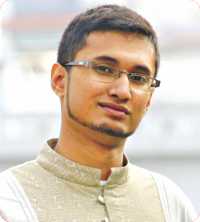 |
|
| Courtesy: Rashik Bin Manzur |
|
“The new generation is totally deprived from the truth of the actual history of our country. I consider myself lucky to know a few facts about the history but I feel for the upcoming generation who will, unintentionally, be clueless.” Manzur thinks, education is a right for all, thus no one has the right to corrupt it. Taking that right away from us is like taking general knowledge away from us. He says, "History is not a story book you can just edit and change, whatever happened has already happened, it is not something that we are predicting. Therefore it is ridiculous that our nation is still suffering from controversies related to its history. He also mentions, “It is something you cannot just make up, history is made, and the young generation should know how this nation became one.” Manzur concludes by saying, “The best way I think that this can be resolved is by having a mutual understanding between all the major political parties and come up with a proper way of not distorting the history anymore.”
(BBA student from North South University)
Ferdousi Priyabhashini
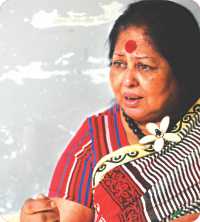 Distinguished sculptor Ferdousi Priyabhashini, an absolute patriot and survivor of 1971 war crime, points out the appalling part of today's education system, is that, children are being the worst victims of the distortion of the history of our country. Besides, the families are also do not nurture them with the essence of Bangla culture and heritage these days, fears Priyabhashini. She exclaims, “I believe, if there can be a Ministry for Liberation War Affairs, then why cannot there be a strong legislation for restricting such occurrences? Moreover, 'Liberation War' should be taught as a separate subject in every grade where books of different authors can be used. For example, 'Chotoder Muktijuddho' by Dr Mohammed Zafar Iqbal can be taught in the preliminary classes.” She suggests that universities should have a faculty on liberation war so that a good bunch of educated youth can merge to protect the history. "They will roam around the country in groups and gradually reach all the schools of the 65 districts. But extensive education and research are needed for that. In today's world, War Studies is a matter of focus. These students can easily go for higher studies, choose professional career in this area and represent Bangladesh amongst the world," adds Priyabhashini. “History of Liberation War should not be confined within classrooms. Libraries should be set up in parks, bus stands, beside tea stalls where anyone can delve into reading. Children of all social classes will have the opportunity to read and also enjoy the open space which is a rare pleasure to get now days”, asserts the optimist Priyabhashini. Distinguished sculptor Ferdousi Priyabhashini, an absolute patriot and survivor of 1971 war crime, points out the appalling part of today's education system, is that, children are being the worst victims of the distortion of the history of our country. Besides, the families are also do not nurture them with the essence of Bangla culture and heritage these days, fears Priyabhashini. She exclaims, “I believe, if there can be a Ministry for Liberation War Affairs, then why cannot there be a strong legislation for restricting such occurrences? Moreover, 'Liberation War' should be taught as a separate subject in every grade where books of different authors can be used. For example, 'Chotoder Muktijuddho' by Dr Mohammed Zafar Iqbal can be taught in the preliminary classes.” She suggests that universities should have a faculty on liberation war so that a good bunch of educated youth can merge to protect the history. "They will roam around the country in groups and gradually reach all the schools of the 65 districts. But extensive education and research are needed for that. In today's world, War Studies is a matter of focus. These students can easily go for higher studies, choose professional career in this area and represent Bangladesh amongst the world," adds Priyabhashini. “History of Liberation War should not be confined within classrooms. Libraries should be set up in parks, bus stands, beside tea stalls where anyone can delve into reading. Children of all social classes will have the opportunity to read and also enjoy the open space which is a rare pleasure to get now days”, asserts the optimist Priyabhashini.
(Sculptor)
Ananta Yusuf
Ananta Yusuf considers distortion of history to have a long lasting aftereffect. “Usually, what we call the 'political or historical consciousness', grows in a person during the secondary level of his study life. I remember when I was in class VI, election was held and a new government came to rule. That year a whole new chapter on a particular leader was added in our Bangla book which previously was absent. The language seemed glamorous and in a way 'linear'”, remembers Yusuf. He is afraid that such drastic changes are misguiding the youth. "As a result, our latest generation are ignorant towards history and for them, history means clash between two or three political parties which is absolutely unexpected," adds Yusuf. He also states, “I believe, under father of the nation, Bangalees fought for our independence and the role of each and everyone was significant. History should be perpetuated, not 'politicized'", urges Yusuf.
(Student of Department of Media Studies and Journalism, University of Liberal Arts Bangladesh)
Lubna Mariam
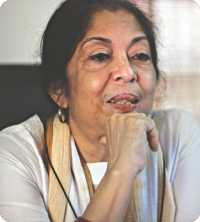 The War of Liberation was fought by the freedom Fighters for a reason, to gain independence. Lubna Mariam says, "the dream of having a shonar Bangla has not been achieved yet and we are still not in a stable position. This stability will only be obtained if the minorities like the poor, the Hindus, and others are brought into the equation, until then the country will remain at stake. On the note, of how history is transferred to the new generations, she opines,"Education in itself is a part of the political game and for a young person to understand history; one should not solely rely on text books. Media and technology can play and important role at making the youth of today avail information. However, it cannot be given to one in a nutshell. At first, one should search for an ideology, and then align it with the right facts available through parents, culture, books and other mediums to gain an insight about the Liberation War." Mariam's confidence and belief is that the younger generation is determined and they they will reach their destination one day in searching the roots. The War of Liberation was fought by the freedom Fighters for a reason, to gain independence. Lubna Mariam says, "the dream of having a shonar Bangla has not been achieved yet and we are still not in a stable position. This stability will only be obtained if the minorities like the poor, the Hindus, and others are brought into the equation, until then the country will remain at stake. On the note, of how history is transferred to the new generations, she opines,"Education in itself is a part of the political game and for a young person to understand history; one should not solely rely on text books. Media and technology can play and important role at making the youth of today avail information. However, it cannot be given to one in a nutshell. At first, one should search for an ideology, and then align it with the right facts available through parents, culture, books and other mediums to gain an insight about the Liberation War." Mariam's confidence and belief is that the younger generation is determined and they they will reach their destination one day in searching the roots.
(Cultural personality)
Sristi Barua
 |
|
| Courtesy: Sristi Barua |
|
For Sristi her cultural background as a musician helped her to come close to the history of independence of Bangladesh. Her music guru was an active member during wartime and his words have influenced her greatly.
Sristi says,"I am aware of distortion of history because I came across an inaccurate piece of information in my younger sister's school text. Even though, the information present in Bangladesh studies books I read as a student, were pretty consistent, but the facts presented to the later generations were inconsistent. Some of the information was either omitted or fabricated. One such issue is the statement of the declaration of independence. This controversy exists and every time a political party changes, a new myth is created. This alteration of history is indeed threatening to the younger generations."She personally believes that in order to solve this crisis, a committee should be formed with people who are true to our nation, intellectual beings and are committed to work for the country in creating a true unbiased portrayal of history.
(Student of English, Chittagong College)
Dr Ayesha Khatun
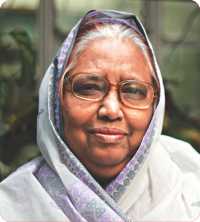 "Distortion of the history of our liberation war is something which is preventing our nation to unite and progress together" says Dr Ayesha Khatun. She says that this happens because it serves the narrow political interest of the incumbent government party. The students are being the victims of this distortion as they get confused by studying contrasting references about our nation's past. "To resolve this problem people from the all walks of society should come forward to compel the government to come up with an initiative to publish an impartial history of liberation war in textbooks, which everybody should accept while distortion of the historical facts should be considered as a punishable offence" she points out. However, erroneous information from hoards of new media such as the internet or satellite television channels can also make the students confused about our history. "The concerned ministries of the government such as the education ministry could launch a website where the unbiased history of the liberation war would be published so that students can cross-check among different sources and be sure about our nation's glorious past," opines the veteran educationist. "Distortion of the history of our liberation war is something which is preventing our nation to unite and progress together" says Dr Ayesha Khatun. She says that this happens because it serves the narrow political interest of the incumbent government party. The students are being the victims of this distortion as they get confused by studying contrasting references about our nation's past. "To resolve this problem people from the all walks of society should come forward to compel the government to come up with an initiative to publish an impartial history of liberation war in textbooks, which everybody should accept while distortion of the historical facts should be considered as a punishable offence" she points out. However, erroneous information from hoards of new media such as the internet or satellite television channels can also make the students confused about our history. "The concerned ministries of the government such as the education ministry could launch a website where the unbiased history of the liberation war would be published so that students can cross-check among different sources and be sure about our nation's glorious past," opines the veteran educationist.
(Former Director General, Secondary and Higher Education, Bangladesh)
Ali Siddiqi
"Studying biased version of history in textbooks during different political party's tenure in government, students are becoming confused about the true history of our nation", says Ali Siddiqi. He himself had to study two different versions of the history of liberation war in textbooks as a national parliamentry election took place when he was in the seventh grade. After being promoted to the eighth grade they found that some important information was modified in the history of liberation war chapter of their newly published Social Science textbook. According to Ali, "One of the indications, of future ideological conflict among the students could be found in different blogging websites where Bangladeshi students are posting articles regarding different aspects of liberation war and due to the absence of a recognised source of our nation's history, heated debates are taking place between the bloggers and people who are commenting on the blog-entries".
(Student, Department of international Relations, University of Dhaka)
Sabbir Ahmed
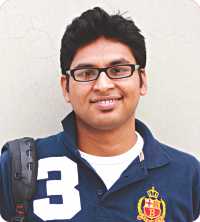 "The history of liberation war written in the textbooks of primary and secondary levels is very insufficient", says Sabbir Ahmed. He loved reading the stories about the birsresthas (war heroes) in Bangla first paper textbook when he was a primary level student. During his senior year he struggled with the distorted version of the history of liberation war printed in textbooks. "It is only after coming to the university when I acquired a comprehensive knowledge about the historical events as I got to read about the historical events from high-quality informative sources such as the Banglapedia". He thinks that such confusion is detrimental for the development of the nation. "Teachers, parents or the superiors in the family who have actually experienced the birth of Bangladesh can play vital roles by clarifying the confusions regarding liberation war. Students should try to read more about the liberation war from different sources to develop an in-depth knowledge on our glorious history," opines Sabbir. "The history of liberation war written in the textbooks of primary and secondary levels is very insufficient", says Sabbir Ahmed. He loved reading the stories about the birsresthas (war heroes) in Bangla first paper textbook when he was a primary level student. During his senior year he struggled with the distorted version of the history of liberation war printed in textbooks. "It is only after coming to the university when I acquired a comprehensive knowledge about the historical events as I got to read about the historical events from high-quality informative sources such as the Banglapedia". He thinks that such confusion is detrimental for the development of the nation. "Teachers, parents or the superiors in the family who have actually experienced the birth of Bangladesh can play vital roles by clarifying the confusions regarding liberation war. Students should try to read more about the liberation war from different sources to develop an in-depth knowledge on our glorious history," opines Sabbir.
(Student, University of Textile Engineering, Dhaka)
Abrar Hasan
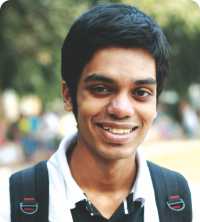 |
|
"I got a lot of my information on history while studying Bangla Literature in Maple Leaf International School. But we had to face a lot of changes in history during school every time the government would change." says Abrar Hasan. "It sounded like Pakistan started killing, we fought back, we won- end of story!" says Hasan. Hasan also mentions, "I believe more than us, the generation after ours would be the victims to the lack of knowledge on history. The generation before ours has faced the real thing. And because of that, we get to hear a lot of the truth from them. But once they are gone, it will be upto us to spread the truth. If we get distorted information like we are now, I do not see the next generation having a clue about what actually had happened and how our country came to be". He suggests "It would be best to have an international body gather up information about 1971 and have them archived. That is the only way we will ever get an unbiased approach to teaching and learning history. It is just not safe in our own hands."
(Student, Ibrahim Medical College, 3rd Year.)
Selina Hossain
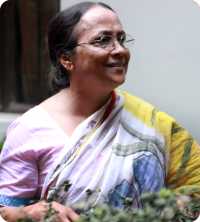 Selina Hossain asks why should history get distorted in the first place. “It only happened after BNP was formed. Zia Ur Rahman did not distort or claim a different history. I will use my logic to understand history” says Hossain. She thinks it is not difficult for school administrators to look into the history of Bangladesh and present it to students, along with world history. “Our teachers should convince students to know their history and instill the right sentiments in them. The 'indifferent' attitude that many young people have towards history is an insult to our sovereignty. A person who does not know his/her history is a rootless displaced person. A person who does not have a sense of his/ her history or culture is a refugee”, says Hossain thoughtfully. Hossain believes that people who were not present during the time of historical events of the country should also take part in documenting history. "They should know, research and find out, write fictions and non-fictions and write in English to reach a global reader,". “We have such rich Bengali Literature. They need to be translated too. Our Language Movement took place here, in this country in 1956. We should use our reality and experience to write our very own literature and history”, points out Hossain. She expects that the youths become prepared- as distinct and collective individuals. “Everyone is so career-oriented. Is there nothing else to do other than building a career? Human values should be taught and spread through history lessons”, advices Selina Hossain. Selina Hossain asks why should history get distorted in the first place. “It only happened after BNP was formed. Zia Ur Rahman did not distort or claim a different history. I will use my logic to understand history” says Hossain. She thinks it is not difficult for school administrators to look into the history of Bangladesh and present it to students, along with world history. “Our teachers should convince students to know their history and instill the right sentiments in them. The 'indifferent' attitude that many young people have towards history is an insult to our sovereignty. A person who does not know his/her history is a rootless displaced person. A person who does not have a sense of his/ her history or culture is a refugee”, says Hossain thoughtfully. Hossain believes that people who were not present during the time of historical events of the country should also take part in documenting history. "They should know, research and find out, write fictions and non-fictions and write in English to reach a global reader,". “We have such rich Bengali Literature. They need to be translated too. Our Language Movement took place here, in this country in 1956. We should use our reality and experience to write our very own literature and history”, points out Hossain. She expects that the youths become prepared- as distinct and collective individuals. “Everyone is so career-oriented. Is there nothing else to do other than building a career? Human values should be taught and spread through history lessons”, advices Selina Hossain.
(Author and Activist)
Royana Rasnat
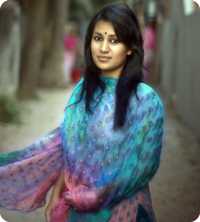 |
|
courtesy: Ariful Islam Suhas |
|
Royana Rasnat passed her SSC from B.C.S.I.R. High school in 2002 and HSC from Riffles Public College in 2004. She says that she “memorised” about kings and queens, but did not study the history of liberation in details. “We only learned about the 7 birsresthas. Teachers do not teach in an interactive way. They only read from text books". She heard stories from her parents and mother-in-law. "I learned about history also from my husband and by browsing Bangla blogs." She adds, “I think students will not learn much if they stay within the boundaries of classrooms. Parents should not rely only on teachers to teach their children history. History should be taught outside classrooms”.
(Graduate student in Psychology, Eden College)
.............................................................................................................................
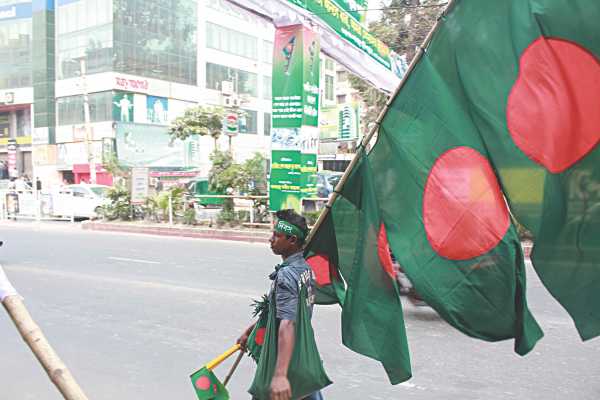
|
|
|
